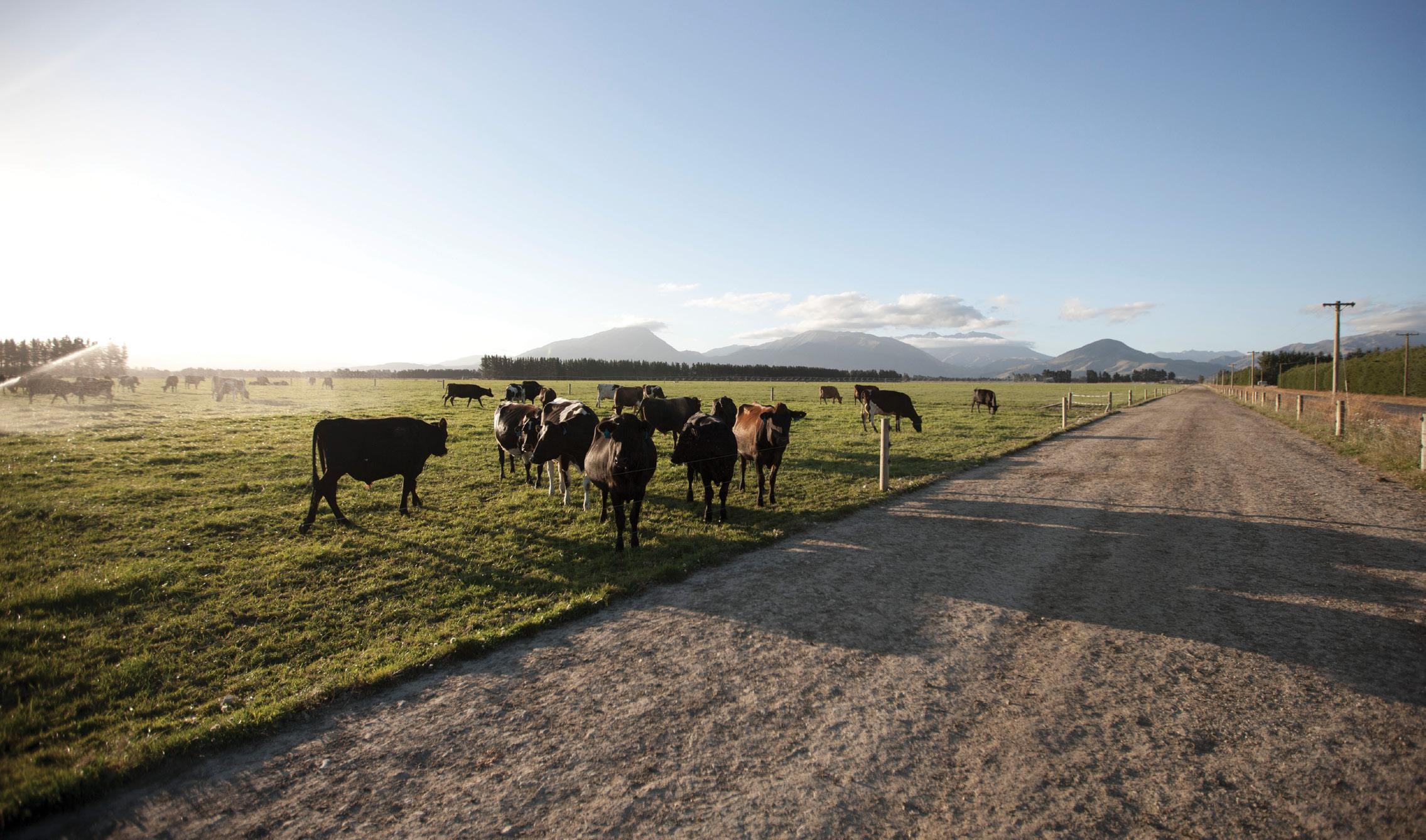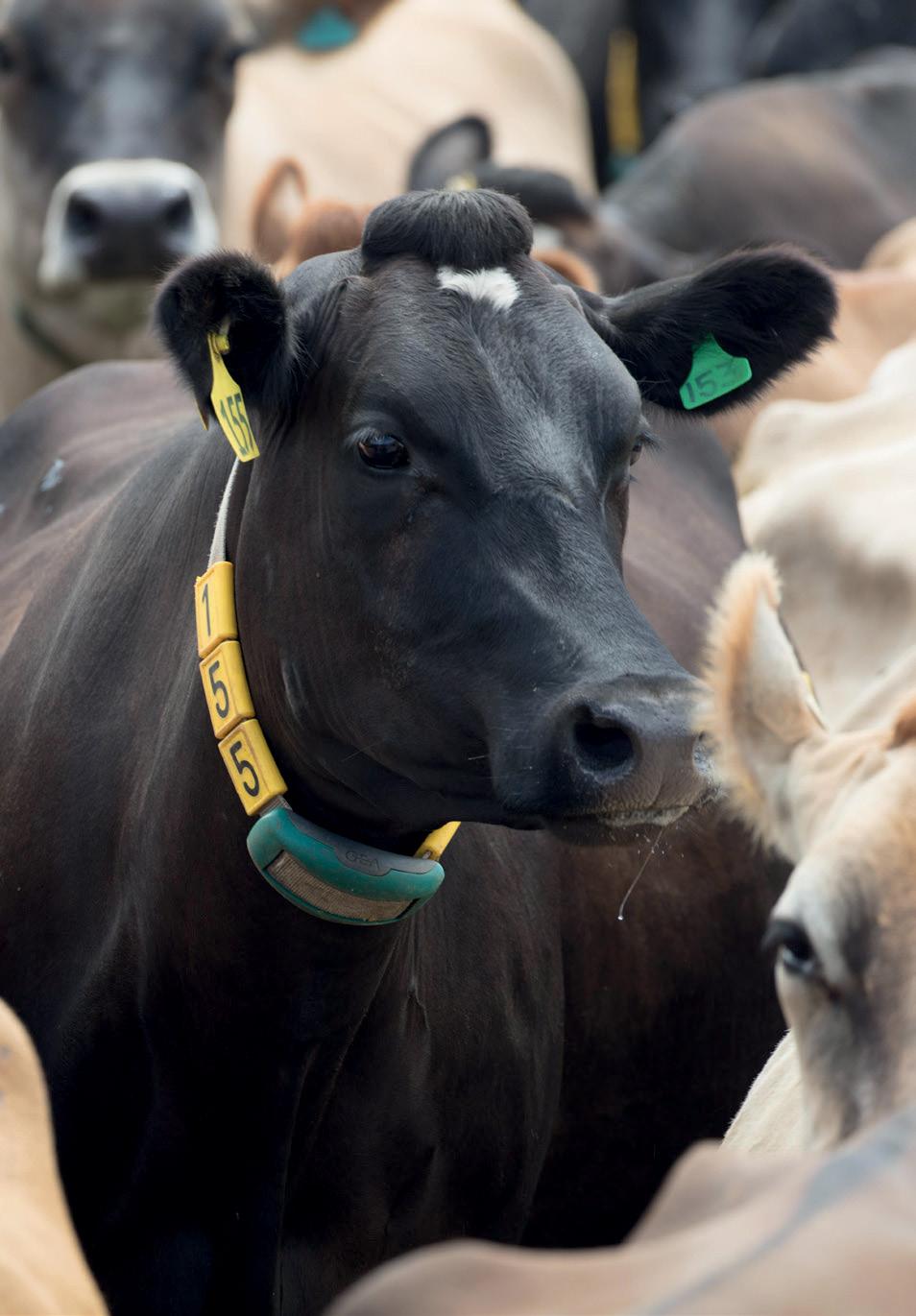
9 minute read
Share farmer: Sam Howard
Clean sweep of awards
WORDS BY JACKIE HARRIGAN PHOTOS BY BRAD HANSON
Sam and Ellie Howard have spent hours improving the shelter and aesthetics of the Shannon property they are share milking, even if they may not be there long enough to appreciate all the benefits.
Sam was named Share Farmer of the Year for the Manawatu in 2021 and added to his win of the Dairy Manager category earlier when he was managing a farm in Taranaki.
Originally from the Manawatu, Sam and Ellie returned from Taranaki four seasons ago to move into a 50/50 share milking role with Shannon owner John Gardner on his 80ha, 240-cow Palmerston North property. Ellie hails from Australia and is a bovine and equine vet, working with Totally Vets in Palmerston North, although she is currently on maternity leave with new son Archie.
The couple brought with them a crossbred herd they had put together and are focusing on the breeding core of cows, from whom they are keen to get herd replacements, focusing on efficiency and fertility, along with good udders, feet and legs.
The crossbred herd are producing an average of 1257kg MS/ha and 439kg MS/ cow, which Sam estimates is around 90% of their bodyweight.
“We are aiming for 100%, but we run a largely grass-based system, with crops and some PKE bought in for supplement.”
EFFICIENCY EXPERTS
operation and with their emphasis on efficiency, have opted for using nominated semen over the top half of the herd for the first six weeks of AI - crossing with Friesian, Jersey or Xbred semen depending on the breed of the cow.
For the next five weeks cows are inseminated with short gestation crossbred semen and for the past two years a LIC Wagyu contract has seen the lowerproducing 100 cows inseminated with the beef cross to move away from producing bobby calves. The Wagyu cross calves tend to be lighter and easier calving than the Hereford semen they were using previously.
As the partnership vet, Ellie has set up the intervention programme of Controlled Internal Drug Release (CIDRs) and the Why Wait programme to improve the
PHYSICAL FARM DATA
80ha Milking platform area 229 Crossbred
Pasture eaten
12.1t DM/ha/yr
Production
439kg MS/cow 1257kg MS/ha
153
Cows/labour unit
Milking supplement
869kg DM/cow PKE
Farm Dairy
24-aside H/B
69%
Six-week in-calf rate Not in-calf rate
13%
11
Weeks of mating
Nitrogen
141kg N/ha Wintering 100 cows wintered off for 6 weeks Runoff Leased
Left: Hold the gate: Vet Ellie Howard is Sam Howard’s secret weapon on all things dairy reproduction and animal health. Sam won the Manawatu Share Farmer of the Year award. Right: The family that works together, stays together: Sam and Ellie Howard with new son Archie. Just two months old, he is getting into a routine.

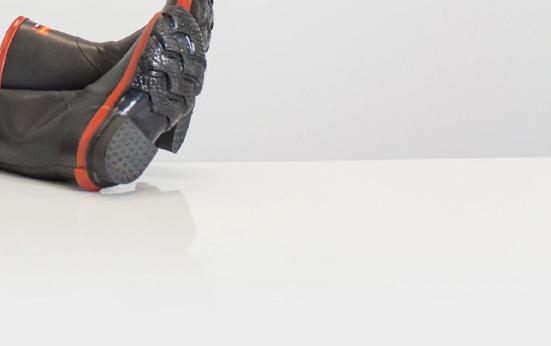
reproductive performance in the herd, and the couple report a 69% 6-week in-calf figure and 13% not-in-calf rate, same as the previous year with one weeks shorter mating period.
“We are using fewer CIDRs each year and so our policy of improving fertility by bull selection seems to be working - the younger cows are achieving higher in-calf rates and the older cows will eventually work their way through the system.”
Breeding their own sire bulls to follow up the artificial insemination (AI) mating has been a priority to Sam and Ellie since they had a scare with M bovis following some service bulls they brought in.
The bulls had already gone off-farm to slaughter when the call came from the contact tracer, but the whole cow herd had to be tested as a precaution - which was a stressful time, Sam said.
“We were lucky to have a negative result, but it made us move towards having a closed herd and being able to avoid that sort of stress in the future.”
Securing a lease block on their back boundary is another plank in the strategy - instead of trucking cows off for winter grazing, as per their contract, they are able to move them through the fence - saving money, time and stress.
Ellie has also had an impact on the animal health plans, coming up with a rigorous focus on early identification of possible mastitis - meaning the couple have had low somatic cell counts (SCC) of 68,000 and 59,000 over the past two seasons - ranking 68th and 48th out of all Fonterra suppliers and placing them in the top 0-1% of results.
‘Now our aim is to get down to an average of 50,000 SCC,” she said.
“We did focus on low SCC as a buying criteria when we were looking for cows and making up the herd, but we also paddle


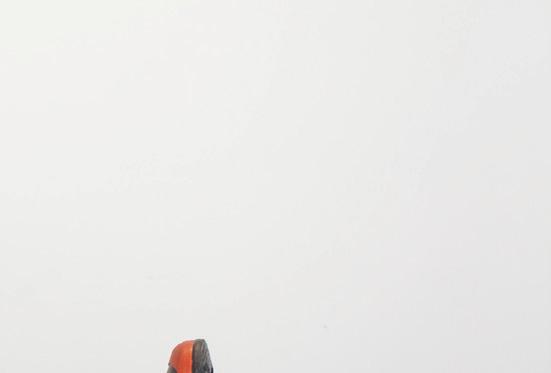
We’re proud to support the Dairy Industry Awards.
Celebrating success from paddock to pro t.
Rural is our fi eld. Talk to us and open the gate to success for your farming enterprise.
Palmerston North
196 Broadway Avenue 06 357 0640
Dannevirke
11 Ward Street 06 374 4266
info@nla.net.nz | www.nla.net.nz
test each cow when they come into the colostrum herd, and if its a positive I culture a sample to identify the actual bug so that we can use the correct drug. Then I repeat the culture again before the end of the withholding period so that we can be sure the drugs are fixing the infection, if not we will dry off that quarter or cull the cow.”
The couple says its attention to detail – doing the basics right – no overmilking, no teat damage and teat spraying every cow – that makes the difference.
Ellie also developed and managed best practice protocols for calf rearing, making sure keeper calves are picked up as soon as they are born, and are fed 2 litres of gold colostrum twice in the first 24 hours from fresh cows. The colostrum is tested for brix and kept in the fridge or freezer, and any sick calves get personal vet attention and their bedding topped up each weekend.
“I like to keep the calf shed as if I would like to lie down in it myself,” she laughed.
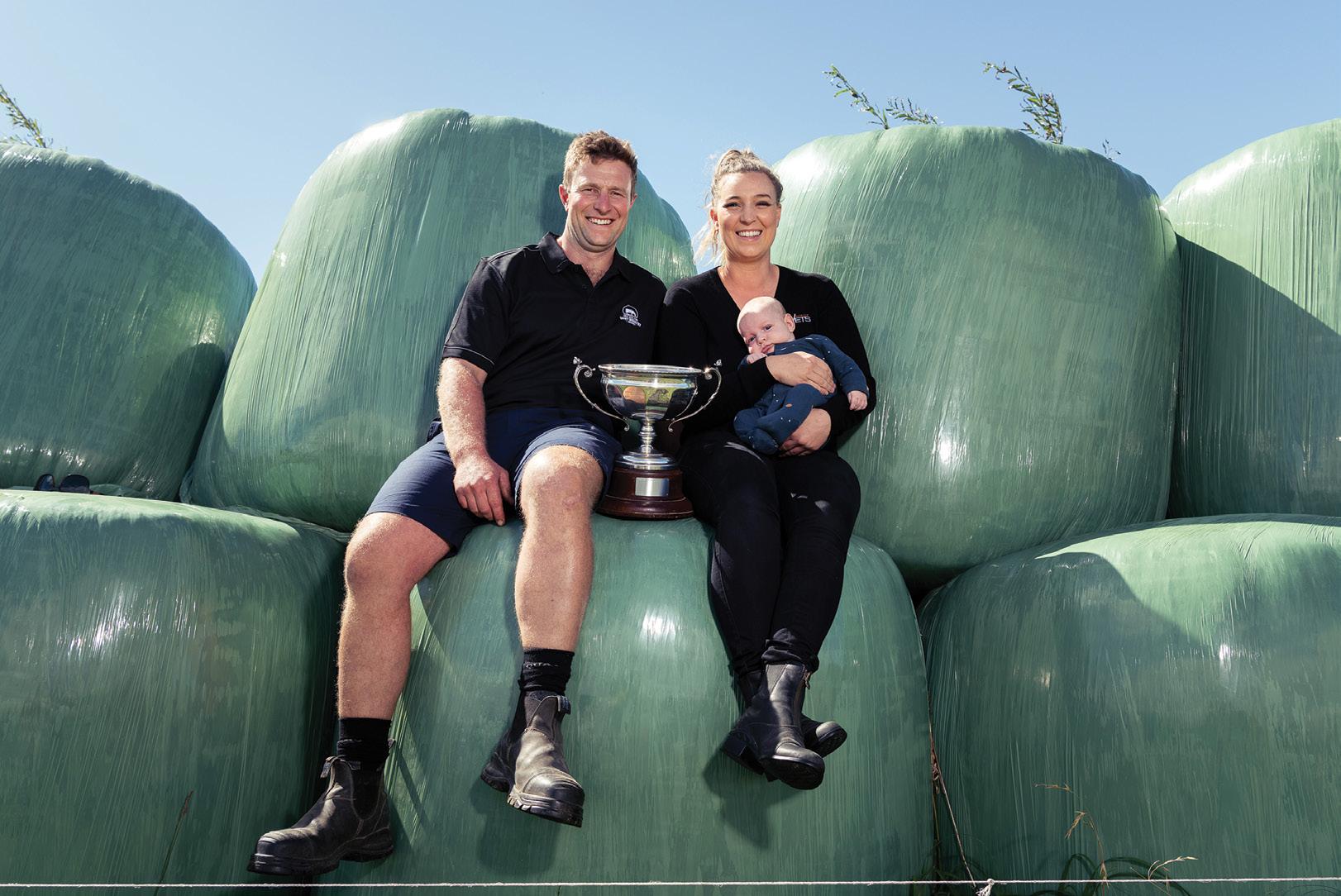
Proud sponsors of the Manawatu
Dairy Industry Awards
We line ponds with HDPE... Get it right the first time!
HDPE outperforms the rest
Seams welded and tested 20 year HDPE warranty Talk to us today, for a dam good job.
0800 433 367
brook@isdamlining.co.nz www.isdamlining.co.nz
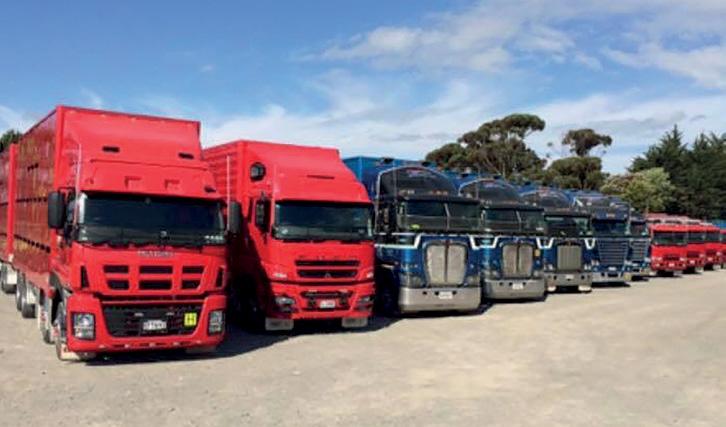
FINANCIAL FACTS
Sharemilking Herd owning 50% Costs shared Normal Fed Farmers contract, plus 50% leased runoff costs Gross farm income $3.94/kg MS Operating expenses $3.24/kg MS
Operating profit
$876/ha
Farm working expenses $2.28/kg MS
Breakdown of costs:
Animal health $112/cow (preventative) Breeding $111/cow (high genetic gain) Wages $0.07/kg MS $0.77/kg MS (unpaid labour) Supplement $0.71/kg MS
Left: In the winner’s circle: Sam, Ellie and Archie with the Manawatu Share Farmer of the Year award.
FOCUS ON BEST PRACTICE
Sam won all eight of the Merit awards and has a huge emphasis on best practice.
“I have a big focus on pasture management and from balance date onwards no supplements are used, just pasture so a close focus on residuals and leaf stage is necessary to keep the quality high and keep the cows as well fed as possible.”
A relatively long round in spring of 28 days ensures maximum pasture growth and quality control is maintained with cutting balage and topping.
“I set everything around round length,

Rural Transport Specialists
and then make sure the cows are well fed by topping up with supplement.”
“It’s just a big balancing act - between growing as much grass as we can and feeding the cows as well as we can.”
Sam uses nitrogen very strategically and carefully, totalling 141kg N/ha/year last season and applying it himself so that he can ensure it goes on when there will be maximum uptake by the plants and minimum leaching through the soil.
“I only put it on when we can get the best response from it - once the soil temperature has lifted in the spring we start with a nitrogen-sulphur product (as these are the two nutrients most likely to be lost over the winter) and then we move to applications of 30kg N/ha, using a little and no more often than once each month.”
No nitrogen is used over the summer when the lack of soil moisture is the limiting factor and then two small applications of 20kg N/ha over the autumn - bearing in mind that autumn can be a danger period for N leaching Sam said.
“We have to ensure that every drop is taken up rather than leached.”
Sam holds a Master of Applied Economics and Intermediate/Advanced Sustainable Nutrient Management, both from Massey University, and has gained the Primary ITO Dairy Production Management Level 5. Prior to entering the dairy industry, Sam was an economist with DairyNZ.
He and Ellie credit their farm owner,
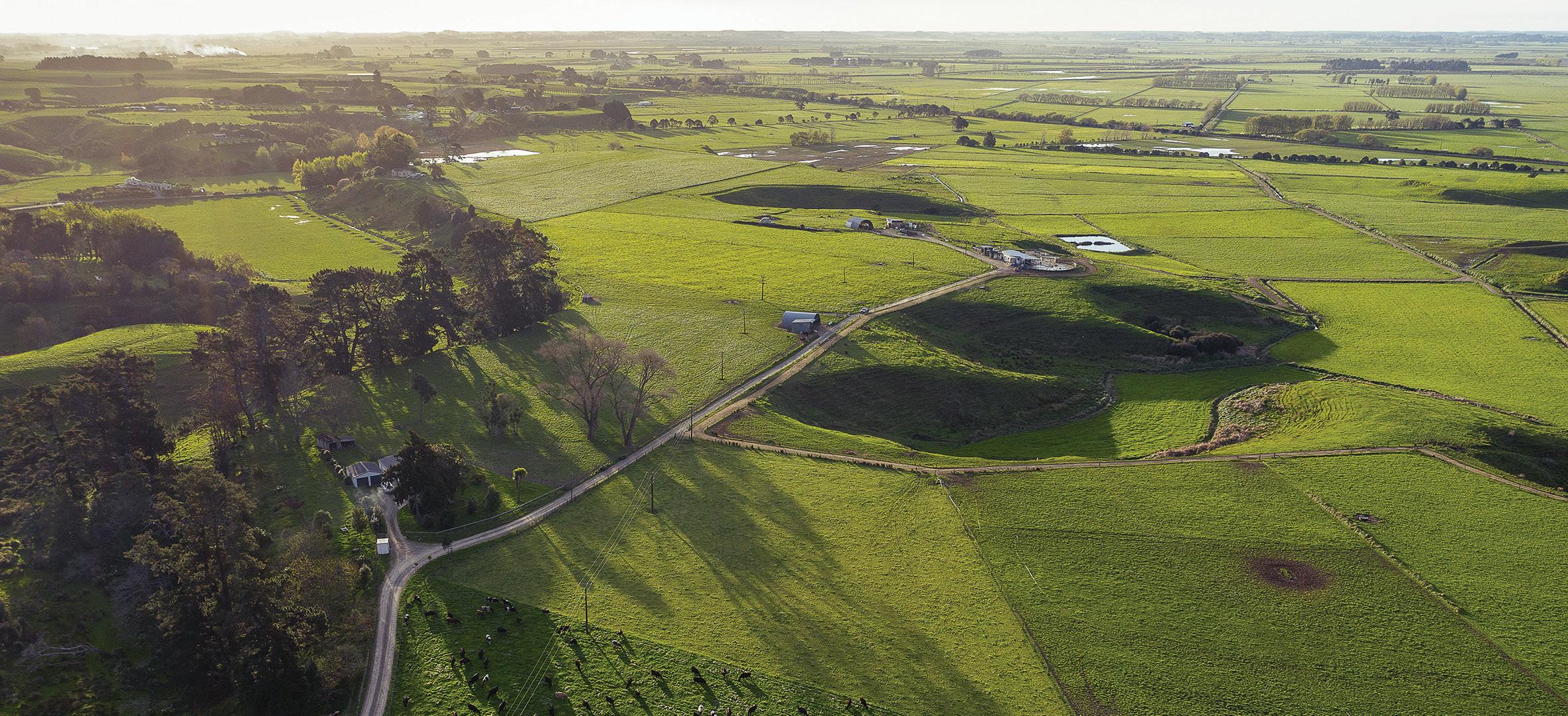
Transparency: Sam and Ellie Howard are sharemilking on a Manawatu property between a State Highway and the Palmerston North train tracks - so they are very aware of what the public can see of the practices on their farm.
John Gardner with a willingness to invest in improvements and maintenance and for supporting them in their sharemilking role.
“He was thrilled that we wanted to improve the farm by planting shelter belts of 130 willows and poplars for shelter, and 550 natives in a plantation area at the back of the farm along with 80 flaxes to enhance the farm dairy with a native planted area,” Ellie said.
ANIMAL WELFARE
John has also invested in doing up all of the cow races so that the couple can reduce lameness in every way possible.
“We don’t chase the cows and avoid pushing them up with the backing gate – I don’t even go out in the yard and chase them into the dairy – I try to avoid them twisting and turning on the concrete,” Sam added.
“It’s all about reducing stress for the cows - we have very few lameness cases when the cows are on once a day (OAD) milking at the end of the season, it’s much more cruisy.”
The couple also credit the family help they have had since returning to the Manawatu. Sam’s parents are retired sheep and beef farmers and are always keen and willing to help out, and with them and very competent and experienced relief milkers, Sam and Ellie are able to get off the farm and not worry.
The couple are involved in many leadership positions in the industry and, on a farm that lies between the state highway and the train tracks, they are very aware of public scrutiny and strive to have transparent practices that the community are happy with, rather than hiding things away. In the future they are focused on moving up to a 600plus-cow sharemilking job in a region that allows them to have access to great dairy farms and a strong equine industry so that Ellie can practice as an equine vet. She loves horses and rides dressage, but loves the idea of working in the equine breeding industry and with race horses as well.
Eventually they would like to own property with both a dairy and equine aspect.


